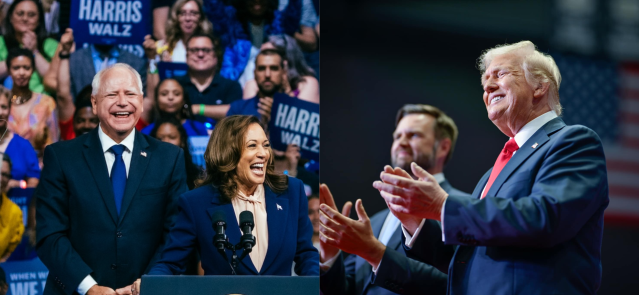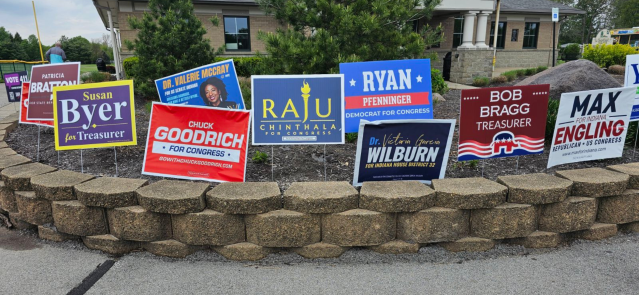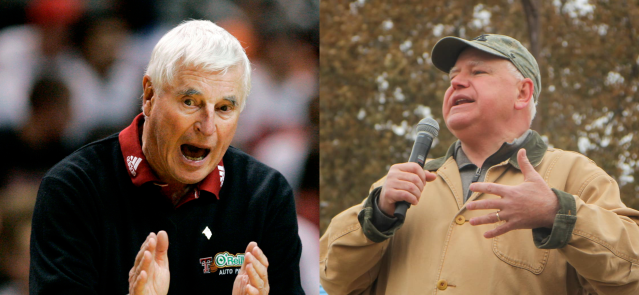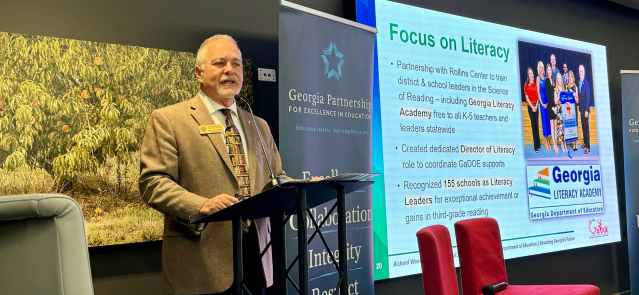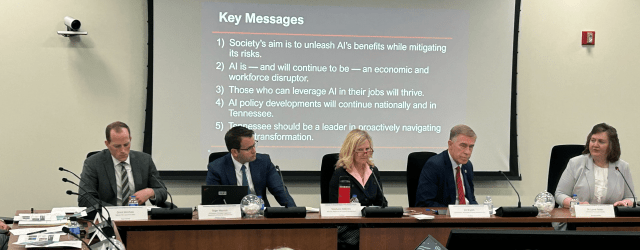With Vice President Kamala Harris officially securing the Democratic presidential nomination on Monday and selecting Minnesota Gov. Tim Walz as her running mate the next day, the tickets atop the Indiana ballot have been forged.
Harris and Walz will take on Republicans Donald J. Trump and Ohio U.S. Sen. JD Vance in the presidential race. Independent Robert F. Kennedy Jr. will also be on the Indiana ballot.
The Indiana gubernatorial tickets have Republican U.S. Sen. Mike Braun and running mate Micah Beckwith taking on Democrat Jennifer McCormick and running mate Terry Goodin, and Libertarian nominee Donald Rainwater and running mate Tonya Hudson.
Here is our analysis of the four tickets:
Trump-Vance, Republican presidential
From July 7 through July 21, Trump had a RealClearPolitics composite polling lead of 47.9%-44.8% over President Joe Biden. Biden led in only one poll in July after his disastrous June 27 debate with Trump. The president dropped out of the race on July 21 and immediately endorsed Vice President Harris. Up to that point, the Trump campaign was designed to take on the 81-year-old Biden. Now, Trump has become the oldest presidential nominee in American history.
The RealClearPolitics polling composite from July 22 through Aug. 4 reads like the proverbial “Tale of Two Cities.” Since July 22, Harris has led in seven of 11 national surveys and forged a composite 47.4%-46.9% lead.
When it comes to battleground states, Trump still has a 4% lead in Nevada, 2.8% lead in Arizona, 0.2% in Wisconsin, 1.8% in Pennsylvania, 3% in North Carolina and 0.8% lead in Georgia (where at his Saturday rally in Atlanta he bashed the state’s popular Republican governor, Brian Kemp). Harris has a 2% lead in Michigan. All of those Trump margins are in atrophy.
When it comes to traditional politics, the Trump-Vance ticket didn’t get a post-Republican National Convention bump. There was no positive polling increase when Vance was selected. In fact, CNN election analyst Harry Enten explained that since 2000, the veep nominee’s net favorable ratings have been +19%, while Vance is at -6%.
“I have gone back all the way to 1980 and he is the first guy immediately after the convention who actually had a net negative. Vance is under water,” Enten told CNN. “JD Vance is making history in completely the wrong way. Usually VP picks are popular. In this case he’s dragging Trump down.”
For historical context, Alaska Gov. Sarah Palin and Indiana U.S. Sen. Dan Quayle, two of the most heavily criticized running mate selections in history, held double-digit positive approval scores in 2008 and 1988, according to Enten.
The Trump campaign hasn’t figured out how to deal with Harris or Walz. Last week at the National Association of Black Journalists convention, Trump attempted to redefine Harris’ ethnicity from Black to Indian. He is now opting out of the Sept. 10 ABC debate despite having made the “anytime, anyplace, anywhere” challenge.
On Tuesday, Trump suggested Biden would make a comeback at the Democratic National Convention in Chicago later this month.
“What are the chances that Crooked Joe Biden, the WORST President in the history of the U.S., whose Presidency was Unconstitutionally STOLEN from him by Kamabla, Barrack HUSSEIN Obama, Crazy Nancy Pelosi, Shifty Adam Schiff, Cryin’ Chuck Schumer, and others on the Lunatic Left, CRASHES the Democrat National Convention and tries to take back the Nomination, beginning with challenging me to another DEBATE,” Trump wrote on his social media platform, Truth Social. “He feels that he made a historically tragic mistake by handing over the U.S. Presidency, a COUP, to the people in the World he most hates, and he wants it back, NOW!!!”
What’s more unhinged, Trump bashing the Republican governor of a crucial battleground state, or the Biden return scenario?
And Trump is trying to put distance between his campaign and the Heritage Foundation’s vastly unpopular Project 2025, the so-called Republican governing blueprint. The problem there is that Vance wrote the foreword for the accompanying book.
Harris-Walz, Democratic presidential
Republican pollster Frank Luntz declared on Wednesday that the new Democratic ticket “is now the front-runner and has the momentum.”
Luntz added in a post on X: “Walz is a good speaker, very presentable, knows the issues and mirrors her [Harris’] point of view. Kamala has the wind at her back and will get another bounce after the DNC. Voters who simply weren’t going to vote at all (for Biden because of his age) are now energized to vote for Harris.”
The crucial momentum phase now comes into focus between now and Sept. 10. The Trump campaign will seek to define Harris and Walz. If she can deflect the attacks, including the current TV ad on her portfolio role in the southern border situation, she could be in an advantageous position to withstand the inevitable “October surprise.”
Gov. Walz is credited with dubbing Trump and Vance “weird,” adding that the former “never laughs, unless he’s making fun of someone.”
FiveThirtyEight analyst Nathaniel Rakich called Walz “the safe choice” for Harris, adding, “Walz seems to offer something for everyone in the Democratic coalition and little to alienate key segments of the party’s base. That’s not to say Walz doesn’t have potential weaknesses. Republicans have already begun to criticize him for his handling of the 2020 protests over George Floyd’s murder in Minnesota, when he did not deploy the National Guard until the day after local leaders asked him to. And there’s a danger that such criticisms could stick.”
Sam Stein and Andrew Egger, writing for The Bulwark on Wednesday, added, “In an era where vibes rule everything around us, Walz by the end was the guy riding the zeitgeist. Walz was most assuredly not a front-runner when this process started. He wasn’t even among the top three midwestern governors in the mix. But his quick ability to brand the Republican ticket as ‘weird’ earned him immediate plaudits among the Democratic faithful. His economic populist pitch, his non-coastal elite résumé, and his mockery of JD Vance kept adding to the momentum.”
Tuesday’s opening Harris-Walz rally was one of joy for Democrats. On July 20, they were looking at a developing worst-case scenario with Biden as the nominee. Two days later, the clouds parted and the fog lifted, and their new ticket could become the best-case scenario.
Braun-Beckwith, Republican gubernatorial
Braun’s property tax proposal has been revised since it was released in late July. It was his first major policy rollout since winning the nomination in May.
“As Governor, I will introduce a bold agenda to deliver historic property tax relief for all Indiana residents,” Braun said in a statement. “My plan focuses on capping property tax increases, updating deductions, increasing transparency, and reforming the referendum process. My commitment to this agenda stems from my dedication to protecting the financial stability and well-being of Hoosier families.”
Republican House Speaker Todd Huston told State Affairs that Braun’s revised plan was a “great proposal to start from” but that he had not yet closely studied its impact.
The proposal for rolling back the past few years’ worth of homestead property tax increases begs questions about its consequences for other taxpayers and local governments. Echoing the concerns of some public schools advocates, officials from groups representing Indiana businesses, farmers and local governments at the Statehouse say they understand the aim of stemming the double-digit increases in homeowners’ property taxes but worry about tax burden shifts and possible big hits to county and city budgets.
Braun said his plan was focused on giving tax relief to homeowners and was “based on the principle that government can never grow faster than the underlying economy and the taxpayers’ ability to pay.”
“Everybody wants an assessed value break or decrease,” Association of Indiana Counties Executive Director David Bottorff told State Affairs. “Every class or property wants that, and every time that a single class or property gets that, it just shifts that burden.”
Katrina Hall, senior director of policy strategy and advocacy for Indiana Farm Bureau, said that farmers have also been hit hard by property tax increases and that Braun’s proposal could make the situation worse.
“Our policy really doesn’t support expanding the homestead deduction, just because what it does is reduce the tax base, and so in doing that, there are shifts to farmland,” Hall said.
And David Ober, senior vice president for the Indiana Chamber of Commerce, added, “Anytime that you deal with the assessed value of a home, it’s going to reduce the net assessed value of a taxing unit, and that’s going to increase tax rates, which will be felt by other property owners. That means commercial and agricultural properties are going to see higher tax rates.”
Matthew Greller, CEO of Accelerate Indiana Municipalities, said any changes to the property tax system must include the recognition that between 45% and 65% of the general fund budgets for cities and towns comes from those taxes.
“Of their general fund budgets, 70% usually, at least, goes to public safety,” Greller said. “So anytime you start talking about property taxes and reductions and caps and all those kinds of things, it’s a direct impact to services that cities and towns provide.”
As for Beckwith, he is still not mentioned on the Mike Braun for Indiana website. The campaign appears to be content on having Beckwith work his base on behalf of the ticket.
A key moment will come at the Indiana State Fair at 2 p.m. Tuesday when Beckwith debates Democratic nominee Terry Goodin on agricultural policy.
McCormick-Goodin, Democratic gubernatorial
While this campaign says it is focused on the “small donor,” the breaking news here is that it is finding little traction among traditional Democratic Party constituencies, particularly labor unions.
McCormick posted a mere $700,000 cash on hand on her midyear report, compared with $1.68 million for Braun. The Republican had a $6.185 million-to-$781,690 advantage for the first half of the year. He outspent her $8.58 million to $290,000 during that same period. The midyear quarterly financial reports through June 30 also revealed Braun holds a $1.68 million-to-$700,013 cash-on-hand advantage over McCormick.
McCormick received a $10,000 donation from Local 157 PAC Fund on July 25, the only large donation posted by her in the past two weeks. The Indiana State Teachers Association’s Indiana Political Action Committee for Education endorsed her on July 1 and gave her a $250,000 cash infusion. UniServ Director Rick Scalf has been temporarily assigned to coordinate the association’s statewide plan for its members’ involvement and activities in their campaign.
The McCormick campaign is attempting to stitch together the coalition that Glenda Ritz won in the 2012 superintendent of public instruction race with teachers and their families, educators, retired educators and suburban women angered by Indiana’s abortion law restrictions. Ritz was outspent 10 to 1 that year, so anything is possible. If the Harris-Walz ticket becomes a movement, that could help McCormick, but if that were a realistic option, you would likely see more traditional Democratic constituencies stepping up.
McCormick said of Braun’s property tax plan in a statement: “Mike Braun claims to support cutting property taxes, but his record shows he’s voted to increase Hoosiers’ property tax bills. Hoosiers are sick and tired of politicians who will say anything to get elected. Mike Braun voted for higher Hoosier property taxes when he had the chance and is now only talking about a tax cut because he’s another politician Hoosiers are sick of.”
Governor
Large donations
Braun: Indiana Association of Beverage Retailers, $25,000 (July 31); Wine and Spirits Wholesalers of Indiana PAC $10,000 (July 29).
Brian A. Howey is senior writer and columnist for Howey Politics Indiana/State Affairs. Find Howey on Facebook and X @hwypol.
State Affairs Statehouse reporters Tom Davies and Jarred Meeks contributed to this article.
